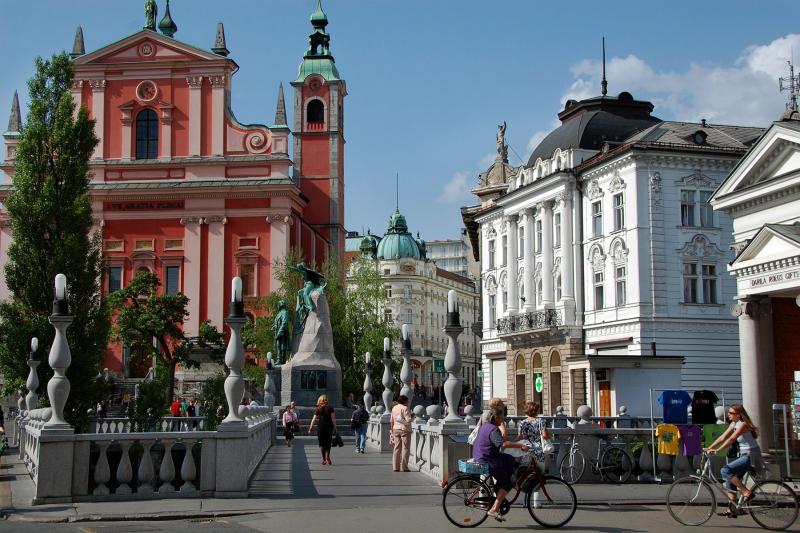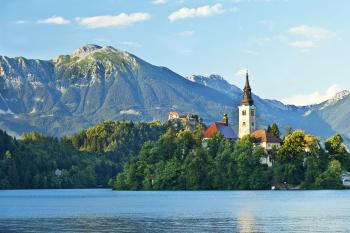Ljubljana: An underrated gem in the heart of Europe
Appears in the Online Edition, April 2018.
Tiny Slovenia -- wedged between the Alps and the Adriatic -- is one of Eastern Europe's most unexpectedly delightful destinations. Located where the Germanic, Mediterranean and Slavic worlds come together, its capital, Ljubljana, enjoys a happy hodgepodge of cultures but remains relatively undiscovered. Walking through its cobbled Old Town, you'll encounter one-of-a-kind architecture, festivals filling the summer air, and a leafy riverside promenade packed with stylishly dressed students -- and just a few tourists.
Ljubljana feels small, but it's by far the country's largest city and its cultural capital. It's bursting with well-presented, we-try-harder museums celebrating Slovenian history and culture. These include the Slovenian History Exhibition at the castle, the City Museum of Ljubljanaand the Contemporary History Museum in Tivoli Park.
But ultimately, this town is all about ambience. It's the kind of place where graffiti and crumbling buildings seem elegantly atmospheric instead of shoddy. But many of those buildings have been getting a facelift recently, as a spunky mayor has been spiffing up the place and creating gleaming traffic-free zones left and right -- making what was already an exceptionally livable city into a pedestrians' paradise. Ljubljana's single best activity is sitting at an outdoor café along the river and watching the vivacious, fun-loving Slovenes strut their stuff.
Batted around by history, Ljubljana has seen cultural influences from all sides -- most notably Belgrade, Prague, Vienna, and Venice. In ancient times, Ljubljana was on the trade route connecting the Mediterranean (just 60 miles away) to the Black Sea. Legend has it that Jason and his Argonauts founded Ljubljana when they stopped here for the winter on their way home with the Golden Fleece. Centuries of rule from Vienna under the German-speaking Habsburgs seems to have both inspired an appreciation of the good life and strengthened the local spirit. And the time it spent in the 20th century as part of Yugoslavia failed to dampened this upbeat vibe.
Today the city is filled with university students -- making it feel very youthful -- and ensuring that most of the locals speak excellent English. This is no sleepy backwater; Ljubljana is on the cutting edge when it comes to architecture, public art, fashion, and trendy pubs. In its relaxed pedestrian center, it seems all roads lead to the main square. Fancy facades and whimsical bridges ornament daily life with a Slovenian twist.
The Triple Bridge -- where the town square joins the river -- is both a popular meeting place and a beloved symbol of the city. The bridge seems almost Venetian. That's because its architect recognized that Ljubljana is located midway between Venice and Vienna, and the city itself was -- and still is -- a bridge between the Italian and the Germanic worlds.
The riverfront market is a hive of activity, where big-city Slovenes enjoy buying directly from the farmer. The market is a great opportunity to connect with the locals. It's worth an amble anytime, but is best on Saturday mornings, when the townspeople take their time wandering the stalls. In this tiny capital of a tiny country, you may even see the president searching for the perfect melon.
As Slovenia is small and laced with modern freeways, virtually every sight is within an hour or two of Ljubljana -- including first lady Melania Trump's hometown. Since the Habsburg days, nearby Lake Bled is where Slovenes have taken their guests -- whether kings or cousins -- to show off their natural wonders. Lake Bled retains an aura of the Romantic Age, with an iconic church-topped island accessed by romantic flat-bottomed "pletna" boats. Strolling the three miles around the lake, visitors enjoy ever-changing views. Crews stroke rhythmically through glassy waters, merging natural and human grace.
A short drive takes you into a totally different landscape: Slovenia'sKarst region -- a high, fertile, and windblown plateau. In this land of stout hill towns and rugged farmers, grapes for the full-bodied local red wine thrive in the iron-rich soil. Since local limestone is easily dissolved by water, the Karst is honeycombed with a vast network of caves and underground rivers. The most dramatic cave to tour is Skocjan. Visitors begin by seeing a multitude of formations in a series of large caverns. Guides tell the story as, drip by drip, stalactites grow from spaghetti-thin strands to sequoia-like stone pillars. In the grand cavern, the sound of a mighty river crashes through the mist.
Though it's just a quick trip away from the tourist throngs in Venice, Munich, and Vienna, Slovenia has stayed off the tourist track -- making it a handy detour for in-the-know travelers. Be warned: Everyone I've met who has visited wishes they'd allotted more time for this endearing, underrated land and its lovely capital.
IF YOU VISIT...
SLEEPING: Lesar Hotel Angel's 12 crisp, white rooms and inviting private garden are plush and inviting (splurge, www.angelhotel.si). Mescanka ("City Woman") rents cozy, well-equipped rooms in a fantastic location along the riverfront promenade (moderate, www.mescanka.si).
EATING: Gostilna As ("Ace"), tucked into a courtyard just off the main square, is a venerable mainstay that pleases fish lovers (splurge, Copova 5A, tel. 011-386-1425-8822). Klobasarna is a low-cost foodie option specializing in "kranjska klobasa" -- traditional Carniolan sausage (budget, Ciril-Metodov trg 15, mobile 011-386-5160-5017).
GETTING AROUND: Virtually all of Ljubljana's sights are easily accessible by foot. When you get tired, flag down a Kavalir (a green electric cart) and ride it anywhere in the pedestrian zone ... for free.
TOURIST INFORMATION: www.visitljubljana.com.
(Rick Steves (www.ricksteves.com) writes European travel guidebooks and hosts travel shows on public television and public radio. Email him at rick@ricksteves.com and follow his blog on Facebook.)


